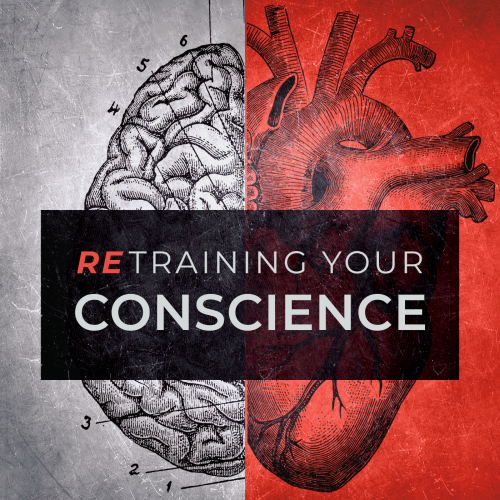
The "Developing a Healthy Conscience" Series
This must-hear series covers everything from how to retrain a dull, oversensitive, or social conscience, to why a weak or legalistic conscience always leads to more sin and less holiness. It details how to deal with legalism in your friends, how to recognize it in yourself, how to recover from legalism without becoming a libertine, and how to grow in your appreciation for the freedom God gives you. This is an important listen for any church or family striving for real holiness instead of man-made counterfeits; for any person whose true liberties are being denied by friends or community; for any new Christian trying to recalibrate his moral sensitivities or any old Christian trying to renew an old dull conscience; for any person trying to recover from a legalistic or a "we're-not-under-the-law-but-under-grace" background... or just any Christian striving "to have a conscience without offense toward God and man." (Acts 24:16)
Sermon 1: What is the Conscience and How Does it Work?
Paul said, "I myself always strive to have a conscience without offense toward God and man." (Acts 24:16) How do you acquire a conscience without offense? Part 1 in the Conscience series deals with the theology of the conscience, as part of God's imagine in man (both pre-fall and post-fall), the conscience's legislative, executive, and judicial functions, how sin distorts all three functions, and how to recognize a good conscience vs the counterfeit. Dr. Kayser likens to conscience to a light on the dashboard that sometimes doesn't work properly, which should be neither smashed nor ignored, but fixed.
Sermon 2: Are You a "Weaker Brother" or Do You Know One?
Part 2 of the "Developing a Healthy Conscience" series describes the positive changes that happen in our consciences at conversion, but why the new baby conscience still needs to be strengthened, and what happens when it isn't. Dr. Kayser expounds Paul's teaching on how to both make sure weaker brothers are protected in their conscience, and that the church be protected from the legalistic doctrine of the weaker brothers. He shows what happens when the three functions of the conscience become sensitized to man's opinions rather than to God's opinion, how to help rather than hurt brothers with weak consciences, and also how and when weaker-brother-ism becomes Phariseeism.
Sermon 3: Why a Weak or Legalistic Conscience Leads to More Sin
The Pharisees show us that legalists — people who add man's laws — always end up being antinomians: people who disobey or throw out God's laws. In Part 3 of the "Developing a Healthy Conscience" series, Dr. Kayser shows how the hedge around the law that modern evangelicals have erected to try to keep people as far away from sinning as possible simply do not work in overcoming sin or promoting holiness, and why those who seem to think sin comes from without rather than within, focusing on issues of dress, activities, substances, etc. almost invariably focus their attention on something other than the heart. He ends with going through several diagnostic questions to help you apply Jesus' teaching about the Pharisees to your own life, and see how your own conscience is calibrated.
Sermon 4: How to Develop a Good Conscience
In the final part of the "Developing a Healthy Conscience" series, Dr. Kayser walks us through the benefits of having a healthy conscience, from confidence in witnessing to accelerated maturity and peace and freedom before God and man, and then walks us through the Bible's methods for developing a "good conscience" — how to cleanse your conscience, retrain your conscience, deal with things still troubling your conscience, and more.
Bad Conscience, Good Conscience - Life of David
Why can't you just "Let conscience be your guide"? Some don't have any conscience issues over things that are clearly unscriptural, while others are tormented by an overly-sensitive conscience over things that the Bible gives liberty on. Consciences are useful if they have been regenerated, trained, sanctified by the Spirit, and fine-tuned to the front sights of the Scripture. But by themselves they are not a reliable guide. How do we keep our consciences from being either insensitive or legalistic? What is involved in retraining the conscience to function as God intended it to function? What bad things automatically happen when we fail to retrain the conscience? This sermon will show you.
Judgment and Liberty - James
What did Jesus mean when He said, "Judge not lest you be judged"? And "He who speaks evil of a brother and judges his brother, speaks evil of the law and judges the law"? Once you can wrap your head around this passage, you will be able to avoid both legalism and antinomianism, and to defend both law and liberty. We ought never to allow our own consciences to be bound by any law other than God's laws. The moment we succumb to the touch not, taste not, handle not laws and traditions of men, we have supplanted the one Lawgiver with another, and we have judged God's law.